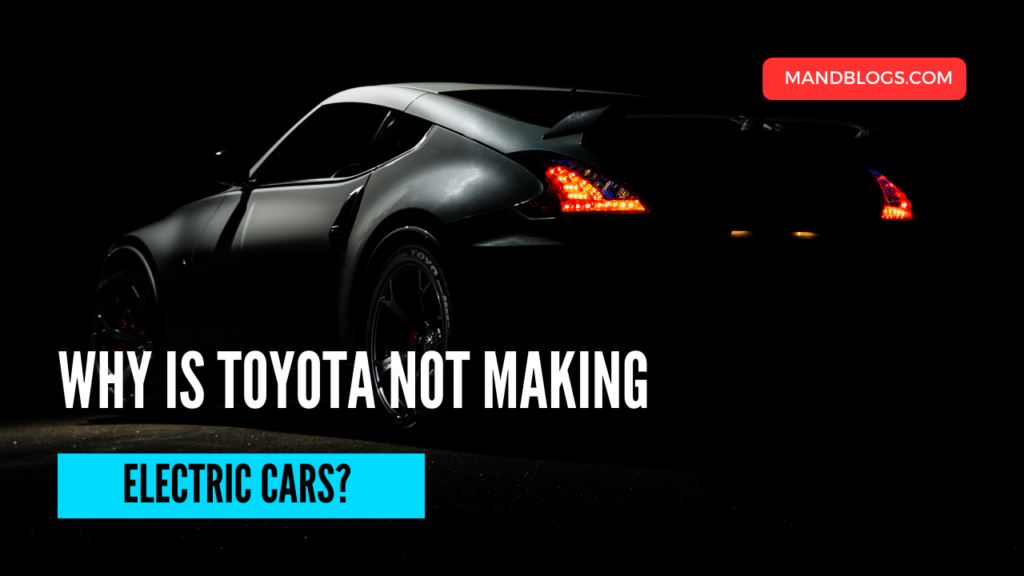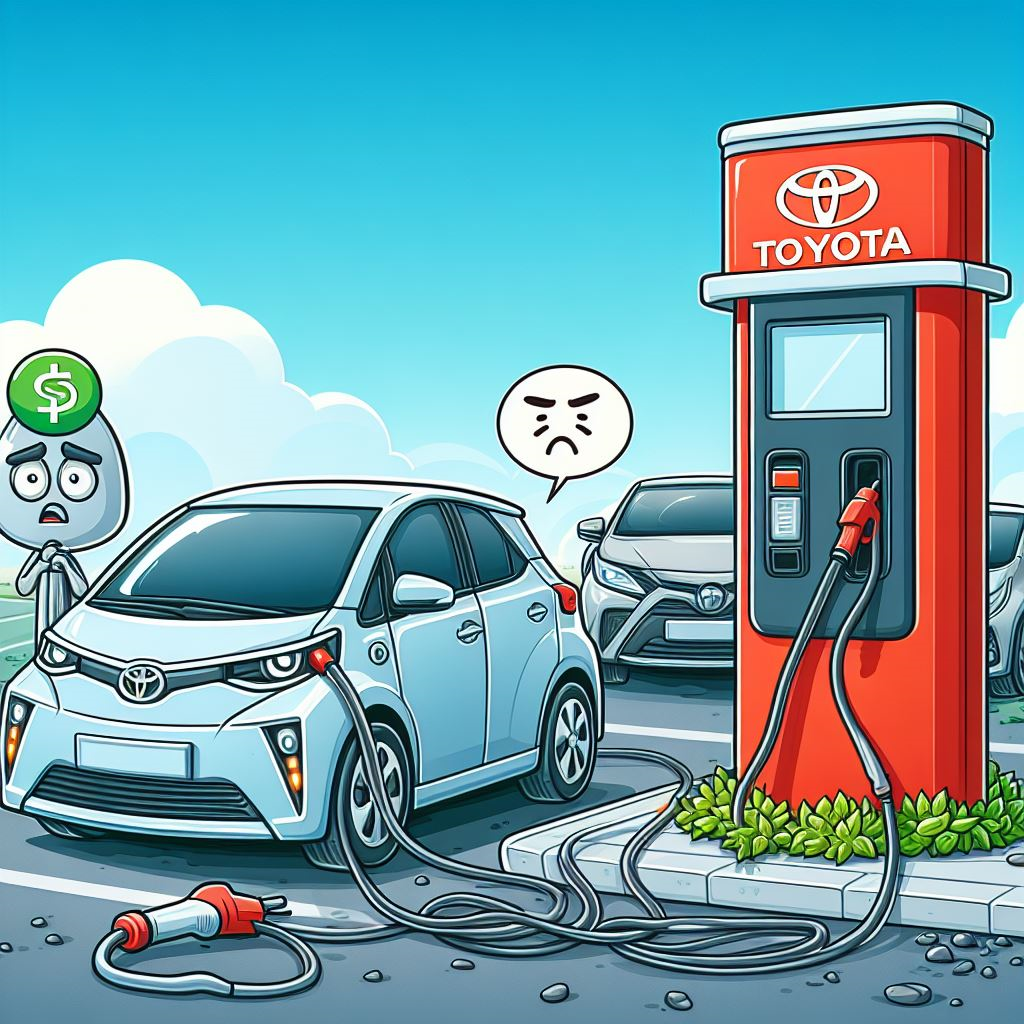
Table of Contents
Introduction
In the rapidly changing world of automotive technology, there have been questions raised “why doesn’t toyota make electric cars?”. We hope to solve the mystery of Toyota’s decision to forgo the electric vehicle (EV) revolution as we delve into this fascinating subject and examine the strategic factors that have led the business in a different direction.
why doesn’t toyota make electric cars?
Toyota’s strategy for electric vehicles can be summed up as follows: Toyota places a high priority on hybrid technology and a broad electrification plan. They have been pioneers in the development of hybrid cars, such as the Prius, highlighting a sensible trade-off between emissions reduction and fuel economy.
Toyota makes investments in a variety of electrified vehicles, such as hybrids and plug-in hybrids, rather than concentrating only on electric vehicles (EVs). Their approach is in line with studies that show a fleet that is partially electric can have lower total emissions than one that is entirely gas-powered and hybrid. To put it simply, Toyota carefully considers the shift and emphasizes a combination of technologies for a more environmentally friendly future. 🌿🚗

Why is Toyota so hesitant to build electric cars?
Toyota’s strategic emphasis on hybrid technology is the reason behind its reluctance to fully embrace electric vehicles. Being forerunners in the hybrid market (consider Prius), they place a high value on striking a sensible balance between emissions reduction and fuel efficiency. Instead of focusing only on electric cars (EVs), Toyota makes investments in a variety of electrified vehicles, such as plug-in hybrids and hybrids.
Their strategy is in line with studies that show a fleet that is composed of both gas-powered and hybrid cars can have lower total emissions than one that is entirely electric. To put it simply, Toyota carefully considers the shift and emphasizes a combination of technologies for a more environmentally friendly future.
Has Toyota dropped fully out of the EV race?
Toyota is still competing in the electric vehicle (EV) market, but they are taking a cautious and practical stance. While some manufacturers are racing to switch to all-electric vehicles, Toyota is still making investments in hybrid technology and a variety of electrified vehicle options. They plan to use hydrogen fuel cell cars, plug-in hybrids, and hybrids.
They stress a balanced transition that takes emissions reduction and practicality into account, as opposed to switching to all electric vehicles. Thus, even though Toyota isn’t spearheading the EV revolution, they are carefully navigating the environment in an effort to create a greener future. 🌿🚗
What is Toyota’s electric vehicle strategy?
Toyota has a multifaceted approach to electrification at the core of its electric vehicle (EV) strategy. With a variety of electrified vehicle types, they hope to diversify their global portfolio and include:
- Hybrid Electric Vehicles (HEVs): Toyota has been a leader in hybrid technology for over 20 years, starting with the introduction of the first Prius.
- Plug-In Hybrid Electric Vehicles (PHEVs): These cars combine gasoline and electric power to offer versatility for a range of driving conditions.
- Battery Electric Vehicles (BEVs): By 2026, Toyota intends to launch ten new BEV models, or 1.5 million EVs annually. A new BEV platform that promises twice the driving range of existing models is also hinted at.
- Fuel Cell Electric Vehicles (FCEVs): Toyota is still dedicated to hydrogen fuel cell technology and wants to achieve sustainable mobility as a whole.
Their overarching goal is to achieve carbon neutrality across the entire lifecycle of their vehicles by 2050, with interim targets for reducing CO2 emissions by 2030 and 203512.
How is Honda performing in the transition to EVs?
Certainly! Honda is actively accelerating its transition to electric vehicles (EVs). Here are the key points:
- Vision for Electrification: Honda aims for 100% electrification of its global automobile sales by 2040. They plan to produce over 2 million EVs annually worldwide by 2030.
- Upcoming Models: In North America, Honda and Acura will launch the PROLOGUE and ZDX EV models in 2024, co-developed with General Motors (GM).
- Honda e:Architecture: In the second half of this decade, Honda’s transition to EVs will continue with a series of EVs based on their Honda e:Architecture platform.
- Balancing Combustion Engines: Despite Honda’s swift ascent to overtake its electric vehicle rivals, Toshihiro Mibe, the CEO, concedes that combustion engines may continue to operate well into 2040 and possibly beyond123. 🚗⚡

Will Toyota stop making petrol cars?
There are currently no plans by Toyota to completely stop making petrol cars. Their current strategy involves a balanced approach that includes both conventional internal combustion engine vehicles and electrified options, even though they are actively investing in electric and hybrid technologies. Toyota is still making popular gasoline-powered models in addition to its dedication to producing plug-in hybrid, hydrogen fuel cell, and hybrid cars. For the company, the shift to an entirely electric future will continue to be gradual and practical. 🚗⚡
Why do some people not like electric or hybrid cars?
For a variety of reasons, some people have misgivings about electric or hybrid cars.
- Range Anxiety: The short driving range of electric vehicles on a single charge is a source of criticism. This anxiety is exacerbated by worries about where to find charging stations and possible inconveniences on lengthy journeys.
- Charging Infrastructure: There is still variability in the accessibility and availability of charging infrastructure. Convenience of charging at home, work, or public stations is a concern for many.
- Upfront Cost: Compared to conventional gasoline-powered cars, electric and hybrid vehicles frequently have higher starting costs. While there are long-term fuel and maintenance savings, buyers may be put off by the initial outlay.
- Perceived Performance: Some enthusiasts believe that driving an electric car isn’t as thrilling. Even though EV technology advancements are changing this perception, it persists.
- Lack of Familiarity: Individuals frequently cling to their familiarity. Since gasoline cars have been in existence for more than a century, switching to new technologies can be intimidatin
In conclusion, there are differing views on electric and hybrid cars due to a combination of pragmatic worries, false beliefs, and familiarity bias. 🚗⚡
Why do some hybrid cars not have an electric-only mode?
Some hybrid vehicles do not have an electric-only mode because of compromises in engineering and design. The main justifications are as follows:
- Power and Efficiency Balance: Performance and fuel economy are the two main goals of hybrid vehicles. A small electric motor is primarily used by some hybrid vehicles, especially mild hybrids, to assist the gasoline engine during regenerative braking or acceleration. There isn’t a specific electric-only mode available on these systems to preserve overall power output.
In conclusion, the need to maximize power delivery and fuel economy is reflected in some hybrids’ lack of an electric-only mode. 🚗⚡
What do you think of Toyota’s electric solar roof car?
Toyota’s solar-powered electric roof car is a creative step toward environmentally friendly transportation. Toyota hopes to use solar energy for charging and air conditioning by incorporating solar panels into the roof of the vehicle. The solar roof is an example of Toyota’s dedication to environmentally friendly solutions, even though it has a negligible effect on total driving range. Such initiatives could be very important in minimizing environmental impact and reducing reliance on external power sources as technology advances. 🌞🚗
Conclusion: why doesn’t toyota make electric cars?
To sum up, why doesn’t toyota make electric cars? is the consequence of a complex strategy based on the company’s history, technological factors, the dynamics of the global market, regulatory compliance, and a dedication to sustainable innovation. Toyota’s unique strategy places it as a forward-thinking industry player, providing a competitive alternative to the electric car paradigm as the automotive landscape continues to change.
FAQs: why doesn’t toyota make electric cars?

Is Toyota anti-electric cars?
No, they make investments in a variety of electrification technologies, but they take a different approach than some rivals.
What are the advantages of Toyota’s approach?
They contend that hydrogen fuel cells have the potential to be fast and long-range refueling devices, and hybrid vehicles are more widely available and affordable.
What are the disadvantages?
In comparison with competitors, their EV offerings are more constrained, and certain environmental organizations take issue with their position on pure EVs.
Will Toyota catch up in the EV market?
Although they plan to introduce more EVs, their dedication to a variety of technologies suggests that they may not be concentrating only on EVs.
Should I buy a Toyota EV?
Think about the things that are important to you: range, charging options, cost, impact on the environment, etc. Do your homework on Toyota and other EVs to make an informed choice.
What are the best alternatives to Toyota EVs?
Competitive EV options are provided by Tesla, Ford, Chevrolet, Hyundai, Kia, and other brands.
Is Toyota a good brand for environmentally friendly cars?
They are highly regarded for their fuel efficiency, and there is proof that their hybrid technology lowers emissions. But for some, their position on all-EVs is cause for concern.
What is the future of electric cars?
The market for EVs is expanding quickly, and governments are beginning to support electrification more and more. Even with the remaining obstacles, EV adoption appears to be on the rise.
Should I switch to an electric car?
This is contingent upon personal circumstances and priorities. Think about things like the availability of charging stations, required driving range, financial constraints, and environmental issues.

Мадонна, икона поп-музыки и культурного влияния, продолжает вдохновлять и поражать своей музыкой и стилем. Её карьера олицетворяет смелость, инновации и постоянное стремление к самовыражению. Среди её лучших песен можно выделить “Like a Prayer”, “Vogue”, “Material Girl”, “Into the Groove” и “Hung Up”. Эти треки не только доминировали на музыкальных чартах, но и оставили неизгладимый след в культурной и исторической панораме музыки. Мадонна не только певица, но и икона стиля, актриса и предприниматель, чье влияние простирается далеко за рамки музыкальной индустрии. Скачать mp3 музыку 2024 года и слушать онлайн бесплатно.
Pingback: Are electric cars safer? Shocking Truth You Need to Know (7 Questions Answered!) - mandblogs.com